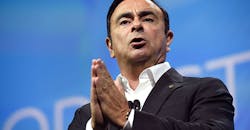Ghosn Molding a Nissan-Renault That Can Cruise on Autopilot
Carlos Ghosn said he’s seeking to change the alliance between Nissan Motor Co. and Renault SA so it will function independently of leadership once he is no longer chairman.
As the executive considers replacing the carmakers’ partnership with a possible merger, Ghosn said in an interview Tuesday there are many possibilities for the future shape of the two-decade-old tie-up. Bloomberg News reported last month that both are in talks to combine under a single stock. In February, Ghosn said the companies would devise a plan to “make the alliance irreversible.”
“I spoke about the irreversibility of the alliance, which means that we have a system and the process by which this alliance goes on independently of who is leading it,” Ghosn said in Tokyo. “I need to take into consideration the fact that there are some reasonable concerns of people asking me what do we do? Who designates the alliance?” He has never given precise indications on when he would step down.
The 64-year-old executive, who revived Nissan and Renault in the late 1990s, wants to forge a single company out of the Franco-Japan alliance, ending the fragmented ownership structure that has deprived them of the full benefits from the partnership. A merger would also help the two pool resources better and take on Volkswagen AG and Toyota Motor Corp. in the new age of electrified vehicles and autonomous driving.
A Lopsided Alliance
The complicated cross-shareholding structure between Nissan and Renault has long been faulted as a lopsided alliance. Renault owns 43% of Nissan and has voting rights, while the Japanese company -- which contributes more revenue and profit -- has a 15% stake in its French counterpart without voting rights.
“One motivation for the merger could be a preparation for a time after Ghosn,” said Christian Stadler, a professor of strategic management who researches the car industry at Warwick Business School. “It might be difficult for the next generation of leaders to step into a structure that relies on the networks he developed over time. A merger will create more straight-forward structures.”
Under Japanese and French laws, Nissan’s voting rights could be revived if Renault’s stake falls to less than 40%. Increasing Nissan’s Renault stake to at least 25% would nullify the French carmaker’s voting rights in Nissan.
The French carmaker’s shares have climbed about 13% this year, giving it a market value of about $35 billion, compared with Nissan’s $44 billion. The Japanese company’s shares are little changed in 2018.
Approvals Needed
Getting a deal done could prove very difficult. The French government owns 15 percent of Renault and may be reluctant to relinquish control over its stake or have its position watered down. Ghosn had earlier said that Japan wouldn’t agree to a tighter structure if France remains a shareholder.
“Anything I do will need the approval of the Renault board, Nissan board, the French government and the Japanese government,” Ghosn said in the interview Tuesday.
Ghosn relinquished his position as chief executive officer of Nissan last year to focus on the partnership. The companies are seeking to double synergies to 10 billion euros (US$12.4 billion) in the six years to 2022.
Mitsubishi Motors Corp. -- in which Nissan became the largest shareholder in 2016 with a 34% stake -- is further deepening the alliance with a shared parts-purchasing arrangement. The door is open to Mitsubishi in the planned arrangement, Ghosn said.
The three-way alliance forecasts unit sales of 14 million by 2022, compared with 10.6 million last year. Volkswagen, the world’s largest carmaker, sold 10.7 million vehicles last year, while Toyota sold 10.4 million.
“I will do nothing that I’m not convinced of that does not correspond to my belief, my track record, and my management approach,” Ghosn said.
By Kae Inoue and Ma Jie
About the Author
Bloomberg
Licensed content from Bloomberg, copyright 2016.
